'Fake smiles abroad are better than rudeness in Russia': ex-basketball player - about emigration to Canada
'01.07.2019'
Source: Ekaterinburg Online
Sophia Khairulina brings up two children in Montreal and runs her own online business.
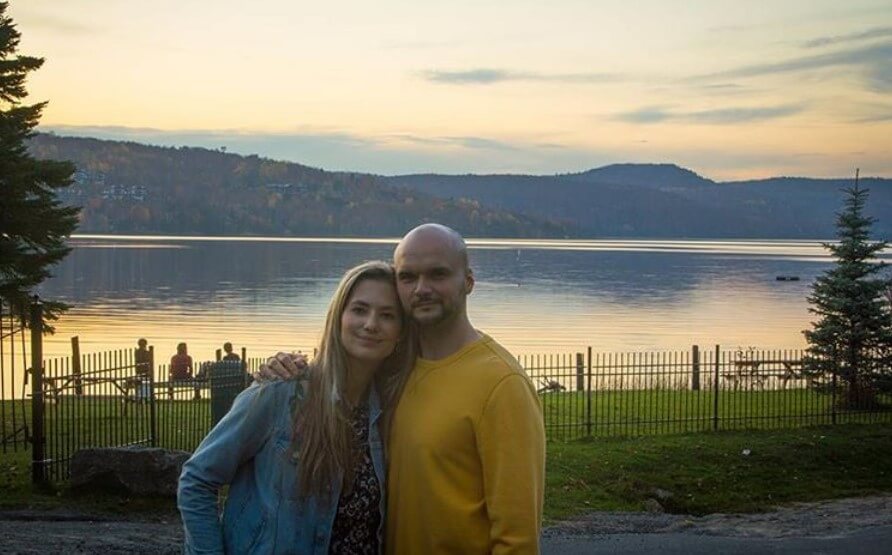
In Yekaterinburg, Sofia Khairulina studied psychology at a pedagogical university and played for the Junior-UMMC team. In 19 years she decided to change her life and moved to Canada, to Montreal, where she learned two foreign languages and met her future husband. Now Sophia and Ildar with their children live near Montreal, in the town of Saint-Jerome.
Редакция Ekaterinburg Online talked to Sophia about how residents of the Canadian province relate to immigrants, how much birth costs at a local hospital, how Canadian kindergartens differ from Russian and what has changed in the country after they legalized marijuana.
About moving to Montreal
- I traveled with my family since childhood. During one of my trips, I had a dream to live in another country, and after finishing my sports career in the UMMC basketball team, I decided to go to study abroad. Chose between the Czech Republic and Canada. Life in the Czech Republic is cheaper, the country is closer to home, but I was beckoned by Montreal. In addition, mom and dad had a girlfriend in Canada, Aunt Lyuda, who promised to take care of me.
I arrived in Montreal in December, when there were thirty-degree frosts in the city, drifts lay on the streets. Then I thought: Is the weather really worse somewhere than in the Urals? It turned out maybe. I entered one of the prestigious universities in Montreal, studied under the program "English language and culture." This is a course that helps an expatriate to learn a foreign language and adapt more quickly in a new country.
I studied in an English gymnasium, and I had a good level of language skills. But in the first days of study, my brain literally tore apart. I knew what I wanted to say, but could not explain in English, I felt powerless. Parents and friends stayed in Yekaterinburg, and there was no one to help me. I was homesick. My acquaintance with my husband helped me to adapt in a foreign country, which eventually became my home.
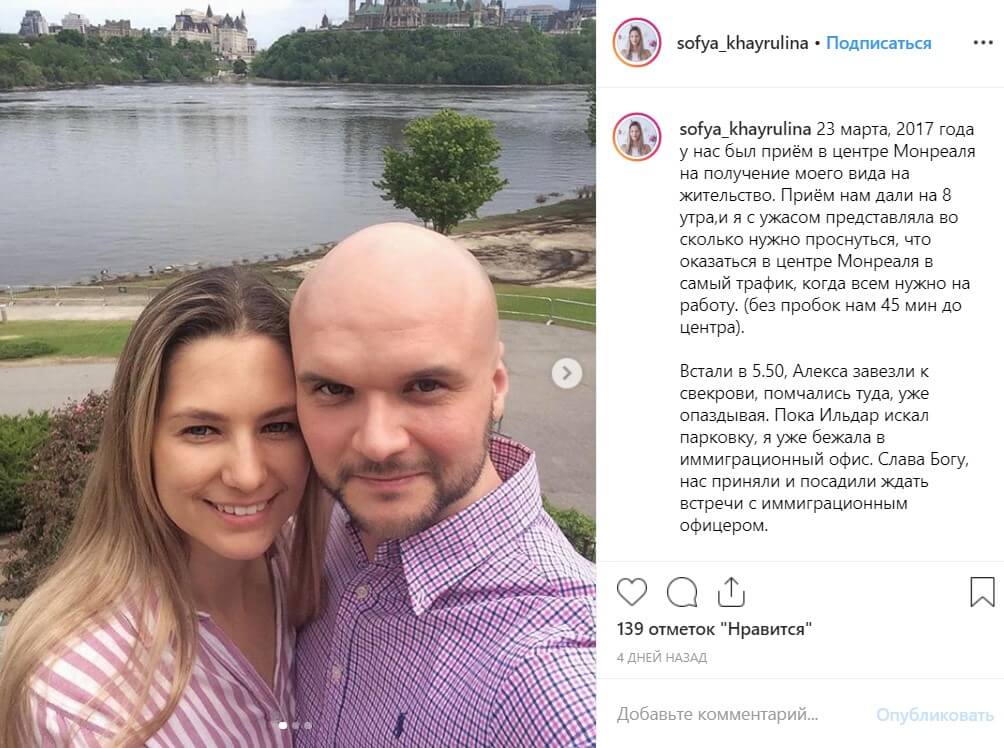
With Ildar (Sophia's husband. - Approx. Е1.RU) my mother's girlfriend brought me together. In the past, she was a student of a French language teacher who herself moved from Moscow to Montreal many years ago. The teacher had an unmarried son, and they decided that we should meet. I was skeptical, but then we became friends, began to meet and live together, and nine months after we got married, we got married. Ildar is a Canadian citizen, so after the wedding I received a residence permit (before that I lived on a student visa).
We bought a house in the town of Saint-Jerome, which is located in 45 km north of Montreal, we had two children. Before giving birth, I managed to take an English course and learned French to an intermediate level, but I did not choose a profession. I could not continue my studies after giving birth. In children, the difference in 2 year and 8 months, I had to take care of them. A year ago, my dad even moved to us to help me with the children and with the housework. True, in the fall he will again go to Yekaterinburg to visit his family.
My husband has his own business, he is a programmer. I help him a little with the affairs of the company, and when the children grow up, I want to take up the development of the family business. I do not want to be just a housewife, so in the future I plan to continue my studies and get an education in marketing. I also have my own small online business. I help women after childbirth to get in shape and lose weight.
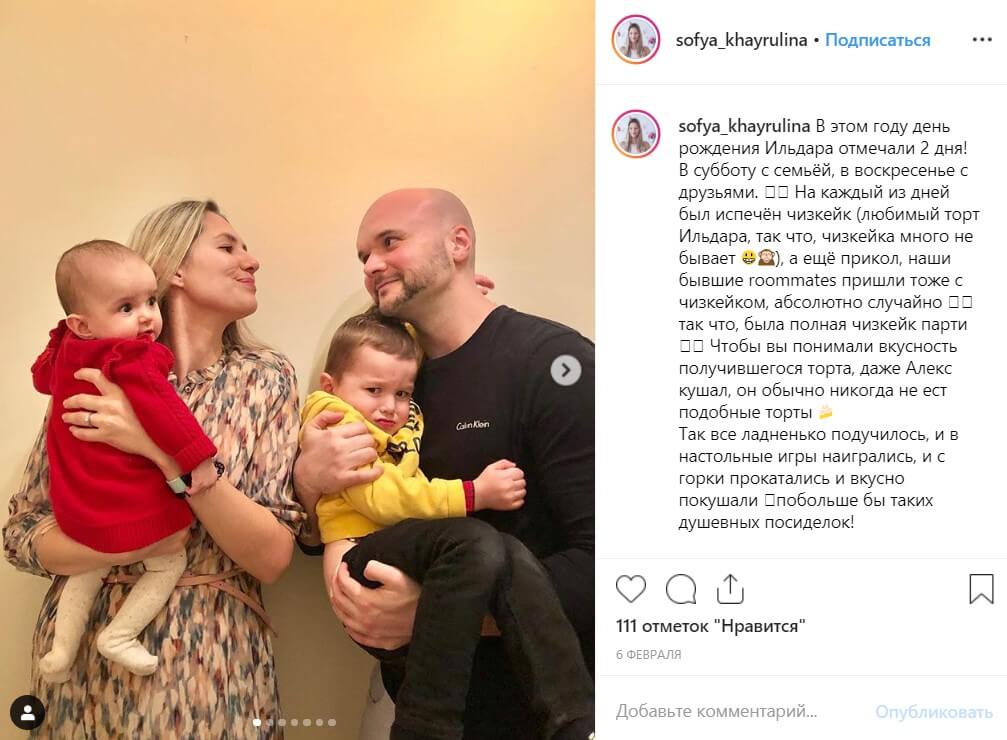
About immigrants and the mentality of Canadians
We live in the French province of Quebec, most of the population is French-speaking Canadians. Quebec people always say hello, ask how you are doing, smile good-naturedly, but there will always be a distance between you. They will not try to make friends with you, call for a visit, especially if you are from another country. Usually, visitors here are watched wary, because they do not know what to expect from them. Especially here in Saint-Jerome, where only local people and very few immigrants live. These are mainly people who have already retired, or families with children. We were lucky, because we have white skin and apparently we are not much different from Canadians.
Canada is a multinational country. Locals are used to the fact that people of other nationalities live nearby. In Montreal, there are neighborhoods that resemble little India or Russia. There are many of our stores, there are sellers working in them who speak Russian. In this case, no one is insured against discrimination. If you send a resume to a person who for some reason dislikes Russians, Arabs or someone else, he is free not to hire you.
On the subject: Our emigration: how does the Russian woman live in British Columbia
Canadians have one feature that is difficult for people from other countries to get used to. They knock at each other. Here it is considered normal. We can say that this is a Canadian tradition, and it has been inoculated into people since childhood. For example, when the husband worked in a large company, he was asked to knock on his boss, if he suddenly did something wrong. They said to him: “If you do this, you will be able to move quickly in the service.”
Once we didn’t mow the lawn, and our neighbor decided that the grass in the yard spoils the view of the street. Then he complained to the city administration. Another time we did not bring garbage cans into the garage, but put them near the garage. This was noticed by the neighbors and again complained. They sent us a letter saying that if we did it again, they would fine us. It is considered normal to call the police here if neighbors make noise after 22: 00. The police necessarily comes and understands.
It seems to us, immigrants, that this is ugly, that it is not being done this way. But here it is considered normal. So Canadians create an atmosphere of security in their city. People know that if they do something bad or wrong, some grandmother who is sitting by the window will definitely see it and complain. Everyone understands that someone constantly looks at them and analyzes whether they are doing the right thing, whether they are not disturbing the harmony in the country. And it really works. People follow the law.
In Canada, tolerate marijuana. You can walk down the street, smoke anasha, and no one will take you to the police. The first time in Montreal, it surprised me. Getting marijuana here is as easy as buying a chocolate bar. During my studies at the university I was offered time and again to buy her classmate. I was amazed at how he did it every day, as if it was in the order of things.
A few months ago, marijuana was legalized. In the very center of Montreal, a shop appeared in which they sell everything connected with it. On the opening day, the store has a kilometer-long queue. In my opinion, only black traders who have lost earnings have suffered from the legalization of marijuana. At the same time, people with cancer were able to legally get marijuana as an anesthetic.

About francophone and anglophone
There are two types of Canadians - francophones (people who mostly speak French) and Anglophones (those who prefer English). Anglophones are easier to communicate, affable, easier to make friends with him. During communication, you feel equal. With francophone not so, they are more arrogant, and snobbery emanates from them.
Francophone most often understand English and speak it, but prefer their native language. Therefore, if you came to a restaurant in the Francophone region and decided to speak in English, then most likely you will be served worse than if you spoke broken French. If you try to explain in their language, they will appreciate the efforts and understand that you respect them, will meet.
The suburb of Montreal is very francophone, so when we moved out of town, I had to learn French from scratch. It is difficult to arrange children in kindergarten or get an appointment to the hospital without knowing French. For several months I learned the language by studying on Skype, and now I feel confident in this environment. Moreover, if I meet a native Quebec, then because of the peculiarities of the local dialect, I understand only 70% of what he tells me.
I like that when I speak aloud in Russian, nobody understands me. I can record audio messages, talk on the phone and not be afraid that someone will overhear me. At such moments in the eyes of others, I am like an alien. They think: "Oh God, what a strange language!". I also like that I can easily integrate into another culture, while I still have my fortress in Canada - the Russian language, and no one can get into it (if only in the Russian region or quite by accident). This is one of the strings that binds me to my homeland.
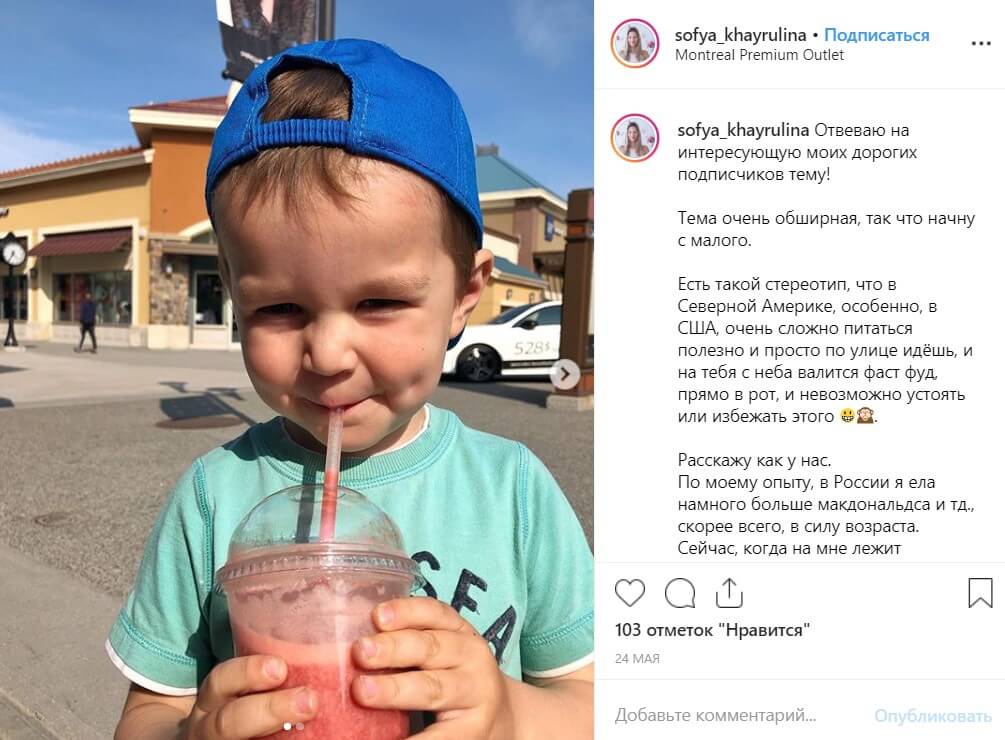
On childbirth in Canada
In Canada, a free medical system for citizens and permanent residents, but when I gave birth, I did not have any of these statuses. I lived on a work visa, without private health insurance. Therefore, the birth of the first child cost us 6,5 thousand dollars (including all medical expenses during pregnancy). Every doctor's appointment, every test cost from 40 to 80 dollars. It was necessary to pay, even if you just want to ask the doctor a question. Only routine tests, ultrasound examinations and examinations during pregnancy cost 1,5 thousand dollars.
I was lucky because I had the most ordinary childbirth, without complications. The birth and stay in the hospital for two days cost 7 thousands of dollars. But, since my husband is a Canadian, the cost of the child, 2 thousands, covered his insurance. We split the remaining amount into payments and paid 200 dollars each month.
On the subject: Immigrant mothers from Belarus compared births in the US and the UK
If the hospital was in Montreal, giving birth would be much more expensive. Also, much depends on the complexity of the case. With me in the hospital was a woman from Europe without insurance. She started preterm labor, which was difficult. I had to do a cesarean section, and during it, too, problems arose. Woman and child barely survived. She left the hospital with a bill in 17 thousand dollars.
During the birth, my husband and mother-in-law were constantly with me. They were in the delivery room, and then, when I was transferred to a regular one, my husband was allowed to be with me and there. In our room there was another bed - especially for him. The child was never taken out of sight, he was always with us. Another difference from the Russian maternity hospitals is that a special bracelet was put on me and my son. Before discharge, they are carefully checked. This is necessary so that no one could take another child out of the clinic.
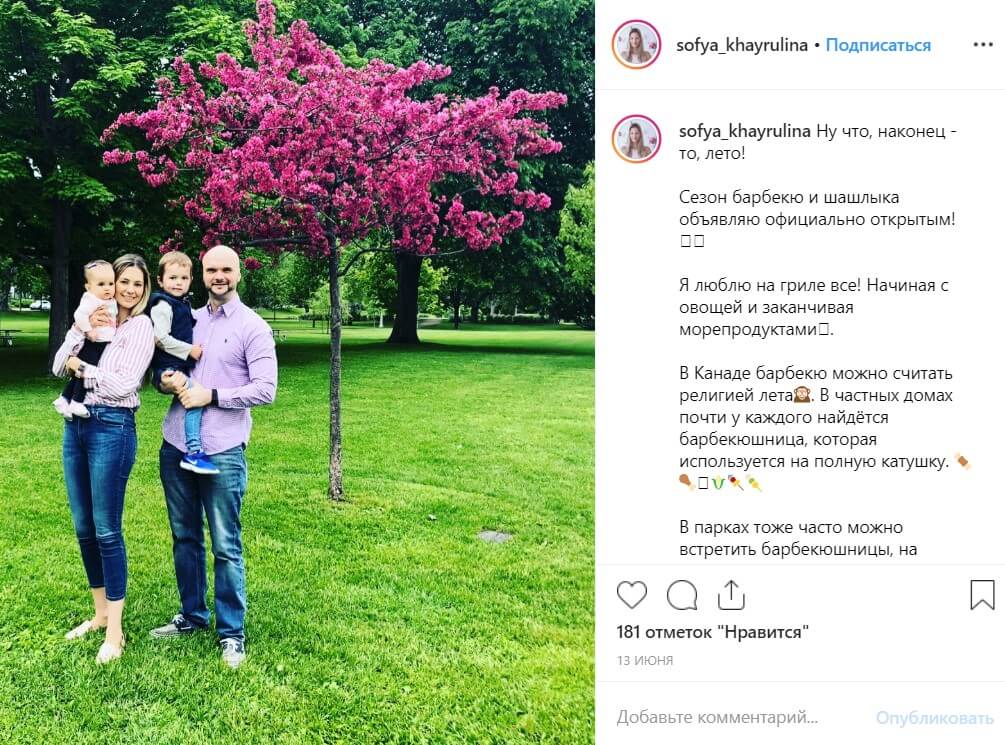
About the kindergarten system
In Canada, there are two types of kindergartens: municipal and private. The first - large kindergartens, in which all are divided into groups. They resemble Russian. The second type is home kindergartens. Since there are not enough places in the municipal gardens, private kindergartens have recently become popular. Everyone can open them. To do this, you need to re-equip your house and pass a commission check. The teacher can not have more 6 children. Of these, only 2 may be younger than 18 months.
My son went to home kindergartens, but the children there were poorly looked after, and we had to pick him up from there. In the first garden there were cases when I came for a child, and the teacher came out of the shower with a wet head, or sat in the kitchen and filled out the documents, or put the series on a pause. When asked where the child was, she replied that he was "playing somewhere below." I didn’t tell how the children spent the day, what they did today. I also wanted to be engaged with the child.
In the second kindergarten there was a good teacher, but there was only one room in it, in which the children both slept, and played, and ate. I felt sorry for them, because they were always sitting in one place, like in a cage. Therefore, from there we quickly took away the child. Another disadvantage of children's home centers is that they often feed on semi-finished products. Unlike Russian kindergartens, here children sleep on special mattresses - mats, which are laid out on the floor while sleeping. Also in Canadian kindergartens there are no pots at all, children are immediately taught to use the toilet.
Now we are waiting for when we can walk to the children's municipal garden. It turned out that in Canada, girls put children in a queue in the kindergarten immediately after they learn that they are pregnant. But, since the queue stretches slowly, the child may turn three years old, and there will never be a place in kindergarten. I didn’t know about it, so we are still waiting for our turn at 13 in various kindergartens.
There are no free kindergartens in Canada. The minimum charge in subsidized gardens is 8 dollars per day (170 dollars per month). At the same time, the cost of staying in private kindergartens can vary greatly. Price range from 40 to 100 dollars per day and up. The high price does not mean that you get into a good kindergarten. Just the owner decided that his services are worth exactly that much and that's all.

About returning to Ekaterinburg
When, after several years in Canada, I arrived on holidays in Yekaterinburg, it seemed to me that I was in a parallel world, in another galaxy. Compared to Canada, there are a lot of people in Russia who may not behave very politely. You notice this as soon as you cross the border.
For example, in Sheremetyevo, a man from Uzbekistan passed the control before me. He did not speak Russian well, and the officer-officer, who checked the documents, did not like it. She barked at him in such a way that he almost fell. The man was completely confused, did not know what to do. I thought: let him emigrant, let him not speak Russian, but he's also a man.
I spent part of the time that I was in Yekaterinburg during my last trip with relatives on Elmash. When I went out into the street, all the muscles in my body tensed. It seemed to me that at any moment they might attack me, that I should be ready to fight back. I was all on alert. Yes, it is considered that everyone feykovo smile abroad. But I think it is better to play a smile than rudeness and rudeness.
At the same time, there are many things in Russia that I miss. Most of all I lack family. Grandparents who grow old and do not see their grandchildren. I miss the taste of Russian cheese and Kinder chocolates, which have some fake chemical taste here in Canada, as well as pigtail smoked cheese, cannot be found in Montreal.







